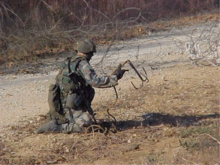Grappling hook

A grappling hook is a device with multiple hooks (known as claws or flukes), attached to a rope; it is thrown, dropped, sunk, projected, or fastened directly by hand to where at least one hook may catch and hold. Generally, grappling hooks are used to temporarily secure one end of a rope. They may also be used to dredge for submerged objects. Historically, grappling hooks were used in naval warfare to catch ship rigging so that it could be boarded.
A common design has a central shaft with a hole ("eye") at the shaft base to attach the rope, and three equally spaced hooks at the end, arranged that at least one is likely to catch on some protuberance of the target. Some modern designs feature folding hooks to resist unwanted attachment. Most grappling hooks are thrown by hand, but some used in rescue work are propelled by compressed air (e.g., the Plumett AL-52), mortar or a rocket.
Grappling hooks are used by combat engineers breaching tactical obstacles. When used as such, the grappling hook is launched in front of an obstacle and dragged backwards to detonate trip-wire-fused land mines, and can be hooked on wire obstacles and pulled to set off booby traps on the wire. Two tools are available for this purpose; the rifle-launched grapnel, a single-use grappling hook placed on the end of an M4/M16 rifle, or the crossbow launched version.[1]
A grapnel can clear up to 99% of the trip-wires in a single pass.[2]
See also
References
| Wikimedia Commons has media related to Grappling hooks. |
- ↑ SAA Crossbow Launched Grapnel Hook
- ↑ Field Manual 3-34.2 Combined Arms Breaching Operations. 31 August 2000. Para. C-57 and Table C-2